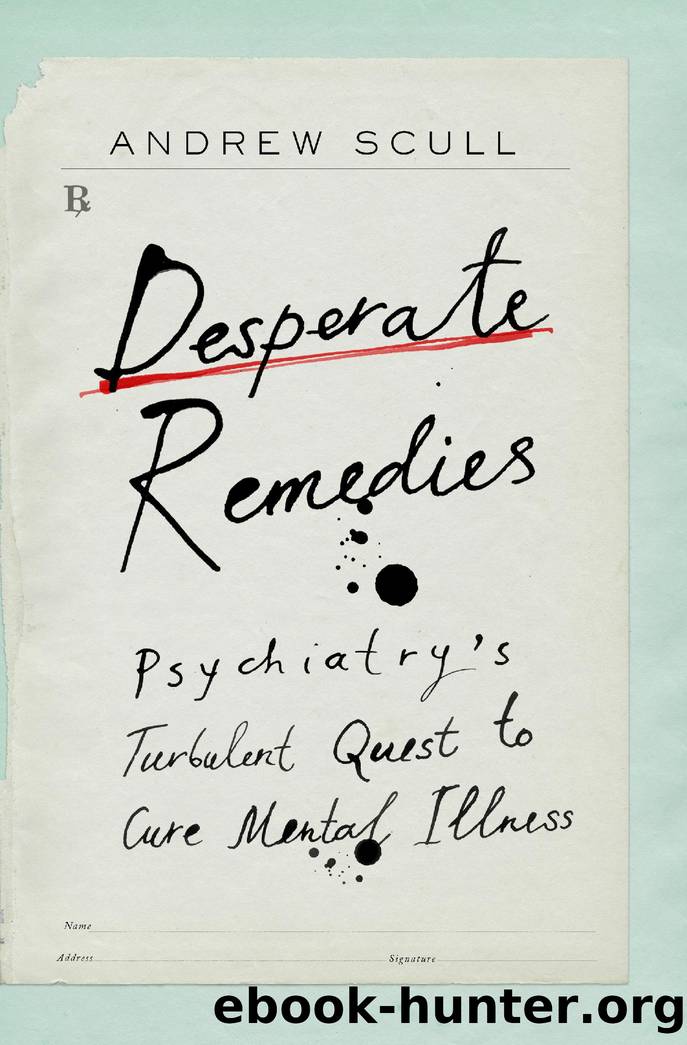Desperate Remedies: Psychiatryâs Turbulent Quest to Cure Mental Illness by Andrew Scull

Author:Andrew Scull [Scull, Andrew]
Language: eng
Format: epub
Tags: Medical, Psychiatry, General, Psychology, History, Science, Social Science, Disease & Health Issues, mental health
ISBN: 9780674276468
Google: PxtoEAAAQBAJ
Publisher: HarvardUP
Published: 2022-05-17T20:50:09+00:00
* * *
THOUGH CBT HAD A VERY DIFFERENT intellectual genealogy, it echoed Adolf Meyerâs notion that mental illness was rooted in faulty habits. Unlike Meyer, though, these therapists began to develop techniques for addressing maladaptive patterns of thinking, beliefs, and behaviors. For anxiety disorders, phobias, panic attacks, obsessive-compulsive behaviors, and some forms of depression, the various tools CBT providesâteaching about the nature of fear and anxiety, and offering patients techniques to avoid or alter self-destructive ways of thinking, reduce muscular tension, or desensitize oneself to feared stimuli via controlled exposureâhave been shown to be effective, though not universally so. Their usefulness in the treatment of depression is more variable and uncertain, and improvements have not always been found to be lasting.50
The distress and disability associated with these conditions is often considerable, so even though the Cochrane review of CBT in generalized anxiety disorder found that fewer than 50 percent of patients showed clinical response to treatment, that degree of improvement is still considerable and helps explain the ability of CBT therapists to attract clients.51 For some of these patients, CBT is certainly useful and welcome. But just as Meyerâs suggestion that psychotic disorders and manic depression could be seen as the product of bad habits was implausible and found few followers, so, too, attempts to extend cognitive-behavioral approaches to encompass these graver forms of mental disturbance have been largely unavailing. As we shall see in Chapter 22, CBT for serious forms of mental illness (schizophrenia, bipolar disorder, and major depression) shows little evidence of broad effectiveness. A further caveat is that Cochrane reviews, the most systematic reviews of the evidence we have, emphasize that the available studies are of low to moderate quality, limiting the confidence one can invest in their findings. CBT can claim that it has some empirical support for its approach, unlike many of its rivals, but its vaunted evidentiary support is less secure than its enthusiasts proclaim.52
Analysts insisted that their rivals were playing whack-a-mole, treating the symptoms of mental disorders and not their root causes. Psychodynamic interventions, they claimed, provided a deeper and more lasting transformation of the personality and attacked the roots of psychopathology. For a skeptical insurance industry, these claims were undercut by psychoanalystsâ continued inability to provide compelling evidence of the efficacy of their interventions, the same problem that Robert Morison of the Rockefeller Foundation had criticized them for in the late 1940s.
For a quarter century after the end of the Second World War, psychoanalytic ideas enjoyed a remarkable degree of authority in intellectual circles, spreading widely in popular culture. In the 1950s and 1960s, analysts made lucrative livings on both coasts and at a few cities in the interior, their incomes outpacing those of many other medical specialties. They dominated most academic departments in medical schools and attracted the most talented recruits to psychiatry. Many psychoanalysts thought their position was unassailable. But theirs would prove to be a fragile hegemony, one that would be reduced to rubble in the space of little more than a decade.
Download
This site does not store any files on its server. We only index and link to content provided by other sites. Please contact the content providers to delete copyright contents if any and email us, we'll remove relevant links or contents immediately.
The Art of Thinking Clearly by Rolf Dobelli(10455)
The 5 Love Languages: The Secret to Love That Lasts by Gary Chapman(9790)
Mindhunter: Inside the FBI's Elite Serial Crime Unit by John E. Douglas & Mark Olshaker(9324)
Becoming Supernatural by Dr. Joe Dispenza(8201)
Nudge - Improving Decisions about Health, Wealth, and Happiness by Thaler Sunstein(7693)
The Road Less Traveled by M. Scott Peck(7594)
Mastermind: How to Think Like Sherlock Holmes by Maria Konnikova(7323)
Enlightenment Now: The Case for Reason, Science, Humanism, and Progress by Steven Pinker(7306)
Win Bigly by Scott Adams(7184)
The Way of Zen by Alan W. Watts(6601)
Factfulness: Ten Reasons We're Wrong About the World – and Why Things Are Better Than You Think by Hans Rosling(4734)
The State of Affairs by Esther Perel(4712)
Gerald's Game by Stephen King(4642)
Man's Search for Meaning by Viktor Frankl(4584)
The Confidence Code by Katty Kay(4251)
Thinking in Bets by Annie Duke(4218)
The Healing Self by Deepak Chopra(3568)
Hidden Persuasion: 33 psychological influence techniques in advertising by Marc Andrews & Matthijs van Leeuwen & Rick van Baaren(3552)
The Worm at the Core by Sheldon Solomon(3486)
